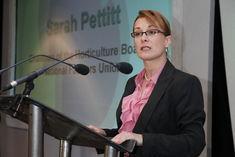
World class science from financially stable facilities is vital if the British horticulture industry is to remain competitive and able to rise to the joint challenges of both growing food and protecting the environment, the National Farmers’ Union (NFU) has warned.
NFU horticulture board chairman Sarah Pettitt sounded the note of caution ahead of the NFU/HDC summer conference at on 23 June Stockbridge Technology Centre. Under the title Health Claims for Fruit and Vegetables: The Facts. She said funding cuts had been responsible for the loss of a number of R&D facilities over the past ten years, taking with them valuable scientific expertise.
“We know how important R&D is to horticulture’s future”, said Pettitt. “This is particularly so at the applied end where research theory is turned into production practice. We have seen a steady decline in that capability and as an industry we must be clear what sort of provision we need for the future. We need assurance that those R&D facilities which are left are financially sustainable and working together to provide horticulture with the science expertise and exploration it needs.
“But we have to be realistic. We know that the money available to the sector is tight, and that we can no longer afford to continue in this way, so we need to cut our cloth accordingly. This will mean some difficult decisions have to be made. However, there are ways ahead. For example we support the approach being taken by several institutions in joining together to offer a platform of R&D facilities and expertise. In this way they afford the best value for the horticulture industry. I think this has to be the way forward and I’d call on other research providers with an interest in horticulture to consider this type of joint working.
Pettitt said the one thing we must ensure is that all those that are a part of an applied platform of R&D are underpinned by the principal of financial sustainability. The industry needs to put its money into financially stable centres of research so that they can continue to deliver the world class research and development that the horticulture industry needs to remain competitive and to respond to the demands of the market.



